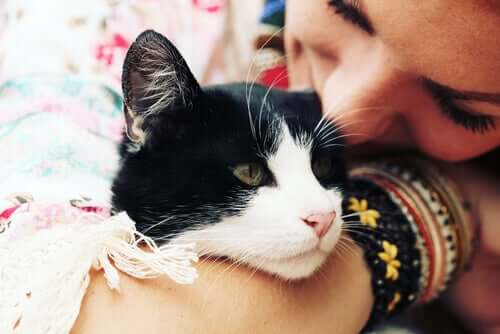What to Do When Your Cat Vomits

Vomiting is very common in cats and dogs and it doesn’t necessarily indicate a serious condition. However, there are times when it could indicate something isn’t right. So, that’s why in this article we’re about to tell you what to do when your cat vomits.
Firstly, if vomiting is chronic, then consult your veterinarian as they can help you determine the cause and prescribe subsequent treatment. However, in most cases, vomiting merely means the animal ate too fast.
What should you do when your cat vomits

1. When your cat vomits, observe them carefully
It’s important that you carefully observe your cat if they vomit, even if it’s only once. What you’re trying to determine here is whether the vomiting is an isolated incident or if it may happen again. It’ll be easier to identify the cause if you do this, and then you can take appropriate action.
For example, you may notice your cat only vomits after eating certain food. Perhaps he does it after ingesting grass. If that’s the case, then remove these items in order to keep them from eating them in the future.
2. Try to find out if there’s a hairball in their throat
Hairballs are one of the most common causes of vomiting in cats. This happens because cats groom themselves with their tongue. This leads to the accumulation of hair on their tongue which they then end up swallowing.
Because their stomach can’t digest hair, the only way to expel these hairballs is through vomiting. If you suspect this is the cause of their vomiting, then let them eat some valerian or catnip, as these plants will help them expel the hairball.
3. Find out if they overindulged
There are times when we humans overindulge when it comes to food, and cats are no different. Food overload can be detrimental as their body isn’t prepared to digest so much of it at once. So, the only to expel it is by vomiting.
In order to avoid this overload, you must keep strict control over the amount of food your cat consumes. Also, make sure they don’t gulp it down all at once and that they’re chewing properly.
4. Is the vomiting chronic?
Occasionally, vomiting may be due to some kind of food intolerance.
If you suspect this is the case then don’t feed the cat for a full day to see whether the vomiting stops or if it continues. If it does continue, then consult your vet as the cat may have a gastrointestinal infection that requires medical treatment.
The veterinarian may determine that the vomiting is due to food intolerance, and he’ll then be able to do tests that will help them determine the specific food intolerance so you can eliminate it from their diet. If necessary, a vet can also advise you on a change of diet and help you plan a menu that provides the same nutrients.
5. Is the cat stressed out?
It may sound strange, but cats also get stressed out. Felines favor routine and when there are changes around them it can all be a source of anxiety for them. Things like moving, the addition of a new member to the family, changes in food… these are common stressful situations that could lead to them vomiting.
6. When your cat vomits, consider the possibility of parasites
Intestinal parasite infections are another cause of vomiting in felines. Your cat will most likely vomit for days if they have them. If you suspect parasites then consult your veterinarian immediately.
Carefully observing your cat for any changes in habits or personality is paramount to identifying whether their vomiting is of consequence or not.
If your cat is still vomiting after 24 hours, then the best course of action is to consult your vet; their life could depend on it.
To conclude, hold off on feeding the cat until you’re certain their vomiting episodes are over.
Vomiting is very common in cats and dogs and it doesn’t necessarily indicate a serious condition. However, there are times when it could indicate something isn’t right. So, that’s why in this article we’re about to tell you what to do when your cat vomits.
Firstly, if vomiting is chronic, then consult your veterinarian as they can help you determine the cause and prescribe subsequent treatment. However, in most cases, vomiting merely means the animal ate too fast.
What should you do when your cat vomits

1. When your cat vomits, observe them carefully
It’s important that you carefully observe your cat if they vomit, even if it’s only once. What you’re trying to determine here is whether the vomiting is an isolated incident or if it may happen again. It’ll be easier to identify the cause if you do this, and then you can take appropriate action.
For example, you may notice your cat only vomits after eating certain food. Perhaps he does it after ingesting grass. If that’s the case, then remove these items in order to keep them from eating them in the future.
2. Try to find out if there’s a hairball in their throat
Hairballs are one of the most common causes of vomiting in cats. This happens because cats groom themselves with their tongue. This leads to the accumulation of hair on their tongue which they then end up swallowing.
Because their stomach can’t digest hair, the only way to expel these hairballs is through vomiting. If you suspect this is the cause of their vomiting, then let them eat some valerian or catnip, as these plants will help them expel the hairball.
3. Find out if they overindulged
There are times when we humans overindulge when it comes to food, and cats are no different. Food overload can be detrimental as their body isn’t prepared to digest so much of it at once. So, the only to expel it is by vomiting.
In order to avoid this overload, you must keep strict control over the amount of food your cat consumes. Also, make sure they don’t gulp it down all at once and that they’re chewing properly.
4. Is the vomiting chronic?
Occasionally, vomiting may be due to some kind of food intolerance.
If you suspect this is the case then don’t feed the cat for a full day to see whether the vomiting stops or if it continues. If it does continue, then consult your vet as the cat may have a gastrointestinal infection that requires medical treatment.
The veterinarian may determine that the vomiting is due to food intolerance, and he’ll then be able to do tests that will help them determine the specific food intolerance so you can eliminate it from their diet. If necessary, a vet can also advise you on a change of diet and help you plan a menu that provides the same nutrients.
5. Is the cat stressed out?
It may sound strange, but cats also get stressed out. Felines favor routine and when there are changes around them it can all be a source of anxiety for them. Things like moving, the addition of a new member to the family, changes in food… these are common stressful situations that could lead to them vomiting.
6. When your cat vomits, consider the possibility of parasites
Intestinal parasite infections are another cause of vomiting in felines. Your cat will most likely vomit for days if they have them. If you suspect parasites then consult your veterinarian immediately.
Carefully observing your cat for any changes in habits or personality is paramount to identifying whether their vomiting is of consequence or not.
If your cat is still vomiting after 24 hours, then the best course of action is to consult your vet; their life could depend on it.
To conclude, hold off on feeding the cat until you’re certain their vomiting episodes are over.
This text is provided for informational purposes only and does not replace consultation with a professional. If in doubt, consult your specialist.








